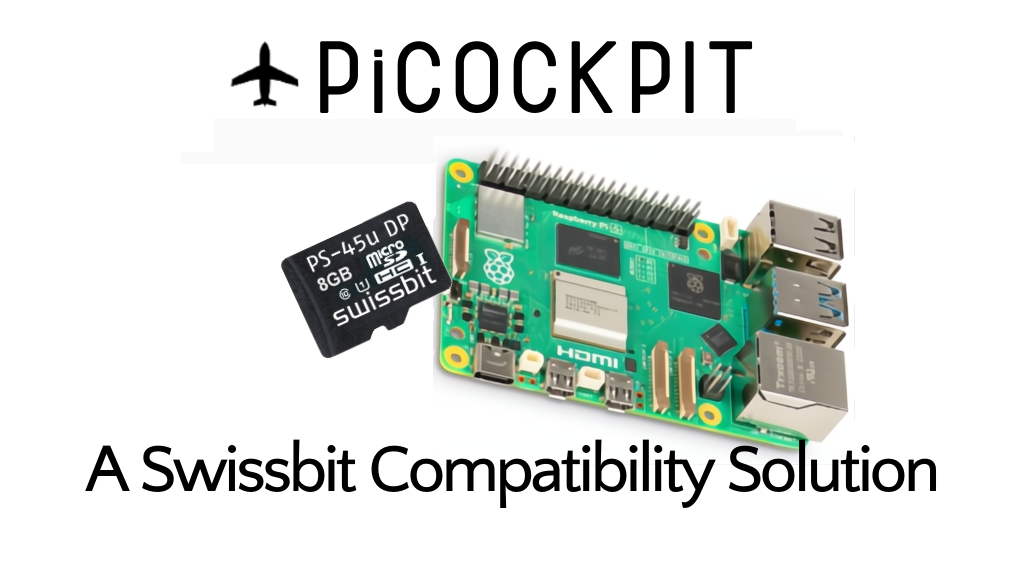How PiCockpit Solved a Swissbit Compatibility Challenge

Using a Swissbit SD card with your Raspberry Pi can offer excellent durability and performance, but it may present unique compatibility challenges depending on your setup.
At PiCockpit, our goal has always been simple: to make your Raspberry Pi work as well as possible.
Recently, we had the chance to help a customer who was facing some unique challenges when trying to use Swissbit SD cards with Balena OS. After digging into the issue, we came up with a solution, and it reinforced something we’re particularly proud of—we have designed PiCockpit to work with almost any OS on Raspberry Pi.
Swissbit SD Cards: What’s the Deal?
For those unfamiliar with Swissbit, they’re known for making high-quality industrial SD cards.
They’re particularly popular for projects that require durability and reliability. Sounds like a perfect fit for Raspberry Pi projects, right? Well, usually it is.
One of our customers was trying to use Swissbit SD cards with a solution based on Balena OS, but they ran into some serious partitioning issues.
It turns out Swissbit SD cards rely on the Master Boot Record (MBR) system for managing partitions. MBR is an older, but still very common, way of partitioning storage devices. It allows for up to four primary partitions, which is usually enough for most embedded use cases.
However, Balena OS handles partitions a little differently, and this is where things got tricky.
The Partition Mismatch: Swissbit SD cards vs. Balena vs. Raspberry Pi OS
Here’s where the problem started: Balena OS doesn’t just use four partitions like Swissbit’s MBR allows—it actually sets up five partitions on the SD card. These partitions are necessary for different parts of Balena’s OS to function properly, but it caused a conflict in combination with a Swissbit SD card.
Essentially, the way Balena’s base OS structures the disk just wasn’t playing nicely with Swissbit’s MBR setup.
On the other hand, Raspberry Pi OS (the go-to for many Pi users) is much simpler. It only uses two partitions—a boot partition and a root partition. This leaner partition structure tends to work flawlessly with Swissbit SD cards.
And our customer wanted a fix.
How We Solved It: Going Beyond Generic Support
This is where our team stepped in. At PiCockpit, we pride ourselves on not just providing a product, but personalized service when it’s needed most. When the customer reached out to us with this partitioning issue, we assigned one of our engineers to dig into the problem and find a solution.
Our engineer worked closely with the customer, troubleshooting the SD card’s partitioning issues and testing different setups to ensure PiCockpit could run without any problems.
After some trial and error, the decision was made to simply install Raspberry Pi OS and then install PiCockpit on top of that.
This wasn’t just a win for the customer—it was also a great reminder of why we do what we do. We want PiCockpit to work for everyone, regardless of what OS or hardware you’re using with your Raspberry Pi.
And sometimes, that means rolling up our sleeves and solving problems on a case-by-case basis.
Why PiCockpit Works with Any Partitioning Setup
This whole experience just highlights one of the things that makes PiCockpit stand out. We designed it to be flexible enough to support many distributions on a Raspberry Pi, whether it’s Raspberry Pi OS or FullPageOS, or something else entirely.
But no matter what partition structure or SD card you’re using, PiCockpit is built to be flexible.
And when there’s a hiccup?
We’re here to help.
We don’t believe in one-size-fits-all support; we’re all about personalized service. Whether it’s sending over one of our engineers to help you work through a compatibility issue or answering any technical questions you might have, we’ve got your back.
Conclusion
At the end of the day, we were able to solve the problem and get our customer up and running with their Swissbit SD cards and Balena OS. It was a reminder that while partitioning and OS compatibility can sometimes throw a wrench in things, we’re always ready to jump in and solve the issue.
So, if you’re facing a Raspberry Pi-related challenge, whether it’s SD card compatibility, partitioning headaches, or something else entirely—reach out to us.
At PiCockpit, we’re here to help you make it work, no matter what OS you’re using on your Raspberry Pi.